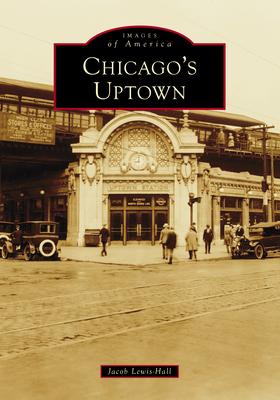Chicago’s Uptown arose in the early 20th century due to advances in public transportation. In less than 20 years, what had been a hamlet transformed into a bustling district. Thanks to the array of elevated rail and streetcar lines, commuters could travel between downtown Chicago and Uptown, encouraging growth in the latter. Boosterism helped entice developers and business owners to put down roots, spearheaded by former Marshall Field’s executive Loren Miller. Within a few years, the blocks surrounding the Lawrence elevated train station were alive with some of the city’s largest entertainment venues such as the Uptown Theater and Aragon Ballroom. In addition to shops and restaurants, Uptown eventually usurped the Loop as the city’s preeminent entertainment district. Eventually, Uptown grew into its own community area, comprised of Buena Park, Sheridan Park, Margate Park, Uptown Square, and Asia on Argyle.
Jacob Lewis-Hall moved to Chicago in 2010, but it was years before he visited Uptown. After relocating to Uptown, he became obsessed with the district’s architecture and character and began the journey to learn about its history. He decided to put together this book in conjunction with the Chicago History Museum and Northside History Collection at the Sulzer Regional Library. Additional thanks goes to the Commission of Chicago Landmarks, whose comprehensive study of the Uptown Square district proved invaluable in this venture.
| FindBook |
有 1 項符合
Uptown的圖書 |
 |
Uptown 作者:Lewis-Hall 出版社:Arcadia Publishing (SC) 出版日期:2024-04-01 語言:英文 規格:平裝 / 128頁 / 普通級/ 初版 |
| 圖書館借閱 |
| 國家圖書館 | 全國圖書書目資訊網 | 國立公共資訊圖書館 | 電子書服務平台 | MetaCat 跨館整合查詢 |
| 臺北市立圖書館 | 新北市立圖書館 | 基隆市公共圖書館 | 桃園市立圖書館 | 新竹縣公共圖書館 |
| 苗栗縣立圖書館 | 臺中市立圖書館 | 彰化縣公共圖書館 | 南投縣文化局 | 雲林縣公共圖書館 |
| 嘉義縣圖書館 | 臺南市立圖書館 | 高雄市立圖書館 | 屏東縣公共圖書館 | 宜蘭縣公共圖書館 |
| 花蓮縣文化局 | 臺東縣文化處 |
|
|
圖書介紹 - 資料來源:博客來 評分:
圖書名稱:Uptown
內容簡介
|










